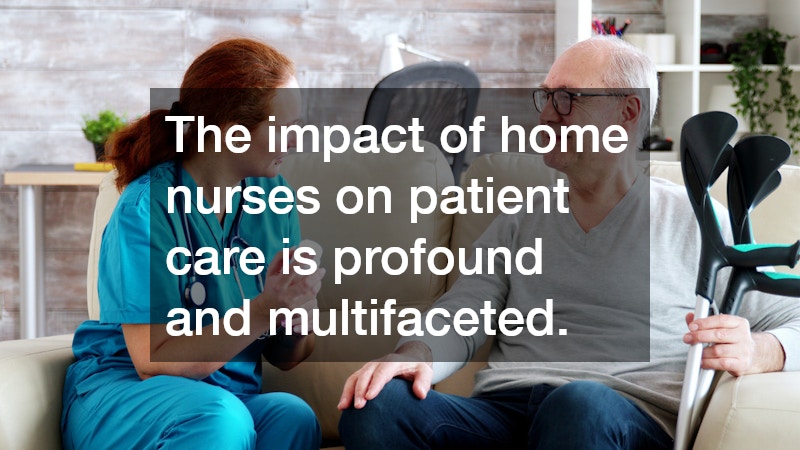In recent years, the role of home nurses has become increasingly significant in the Australian healthcare landscape. As the demand for personalised, accessible and compassionate care grows, home nurses are playing a pivotal role in delivering high-quality healthcare directly to patients’ homes.
This shift not only alleviates the burden on hospitals and aged care facilities but also provides patients with comfort, dignity and improved health outcomes. Understanding the impact of home nurses on patient care reveals the transformative benefits they bring to individuals and the broader community.
Personalised Care in a Familiar Environment
Home nurses provide a crucial link between clinical care and everyday living, ensuring patients receive consistent support within their familiar environment. Unlike hospital settings, home nursing allows for a more individualised approach tailored to the unique needs of each patient. This personalised care is particularly beneficial for elderly patients, those with chronic illnesses, or individuals recovering from surgery or illness. The presence of home nurses in the patient’s own home encourages greater patient participation in their health management, fostering a sense of control and confidence that is often lost in institutional care.
Enhancing Recovery and Reducing Hospital Readmissions
One of the most notable impacts of home nurses on patient care is the enhancement of recovery and rehabilitation processes. When patients receive care in their own homes, they are more likely to adhere to treatment plans, medication schedules and lifestyle recommendations. Home nurses support this adherence by providing education, monitoring health status and promptly identifying any complications. This continuous care reduces the likelihood of hospital readmissions, which can be stressful and costly for both patients and the healthcare system. In effect, home nurses act as vigilant health advocates, ensuring early intervention and preventing health deterioration.
Emotional Support and Psychological Benefits
The emotional and psychological benefits of home nursing care cannot be overstated. Patients often experience anxiety, loneliness and depression when confined to hospitals or aged care facilities. Being cared for at home by a trusted nurse helps alleviate these feelings, providing comfort and reassurance. The familiarity of the home environment, combined with personalised nursing attention, creates a therapeutic atmosphere that promotes emotional well-being. This holistic approach acknowledges that health is not solely physical but also deeply connected to mental and emotional states, which home nurses are well-positioned to address.
Supporting Families Through Education and Collaboration
Family involvement is another critical aspect influenced by home nursing care. Home nurses work closely with family members, educating them on patient needs, care techniques and warning signs that require medical attention. This collaboration empowers families to play an active role in the care process, enhancing support networks and reducing caregiver stress. For many families, having professional nursing support at home means peace of mind and the ability to balance caregiving with other responsibilities. The education provided by home nurses also improves overall health literacy within the household, leading to better health outcomes for all family members.
Alleviating Pressure on the Healthcare System
From a broader healthcare perspective, the integration of home nurses into patient care models helps optimise resource allocation. With hospital beds in high demand and aged care facilities often operating at full capacity, home nursing provides a practical alternative that eases systemic pressure. Patients who might otherwise require long hospital stays can be safely discharged earlier, continuing their care at home with professional nursing oversight. This shift not only reduces healthcare costs but also increases the availability of acute care resources for patients in urgent need. Consequently, home nurses contribute to a more efficient and sustainable healthcare system.
Leveraging Technology for Advanced Care
Technological advancements have further enhanced the impact of home nurses on patient care. Modern tools such as remote monitoring devices, telehealth consultations and electronic health records enable home nurses to deliver sophisticated care comparable to hospital standards. These technologies facilitate real-time communication between patients, home nurses and physicians, ensuring that any changes in health status are promptly addressed. This blend of technology and nursing expertise exemplifies how home nursing is evolving to meet contemporary healthcare challenges.
Preventative Care and Health Promotion
The role of home nurses extends beyond medical care to encompass health promotion and disease prevention. By visiting patients regularly, home nurses can identify risk factors early, provide vaccinations, advise on nutrition and exercise and encourage healthy behaviours. This preventative approach helps reduce the incidence of complications and chronic disease exacerbations. Moreover, home nurses often serve as trusted confidants, encouraging patients to discuss concerns they might hesitate to raise in clinical settings. This trust builds stronger nurse-patient relationships, improving the quality and effectiveness of care.
The impact of home nurses on patient care is profound and multifaceted. Their role helps alleviate the strain on hospitals and aged care services, contributing to a more sustainable healthcare system. As healthcare continues to evolve, home nursing will undoubtedly remain a cornerstone of effective patient-centred care in Australia, offering hope, dignity and health to countless individuals across the nation.
The growing recognition of the value that home nurses bring underscores the need for ongoing investment in this vital sector, ensuring that all Australians have access to quality care where it matters most — at home.



